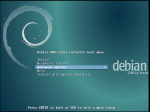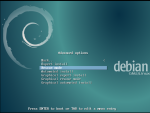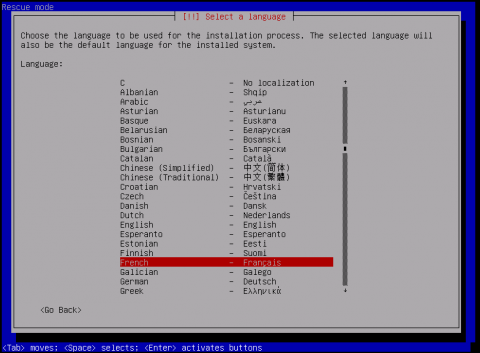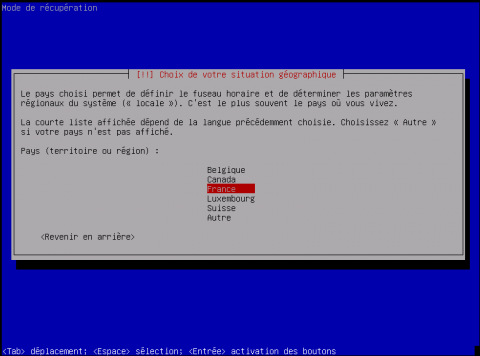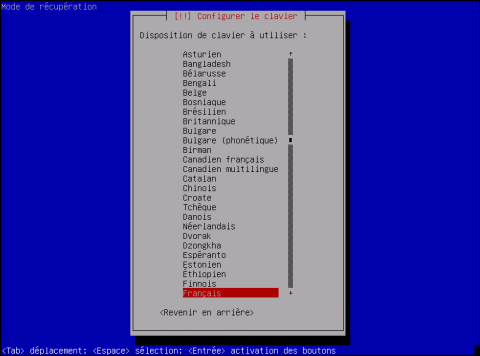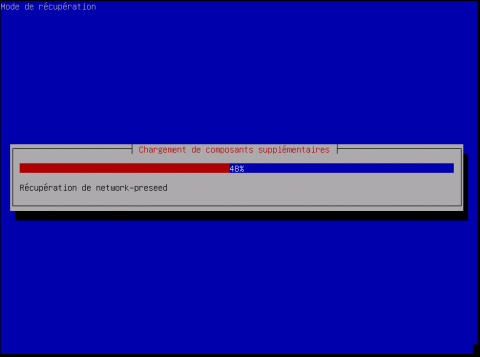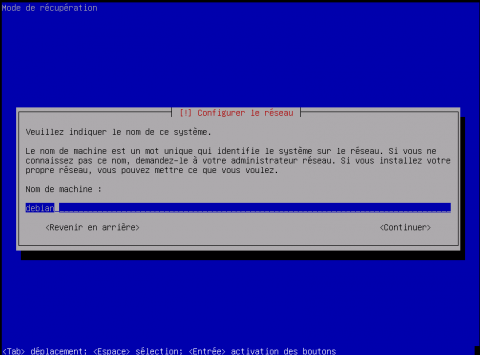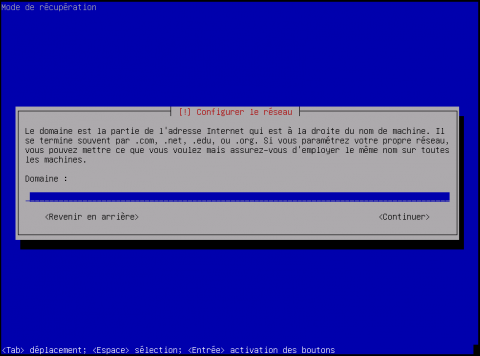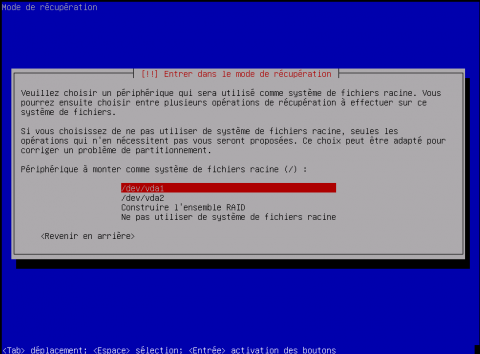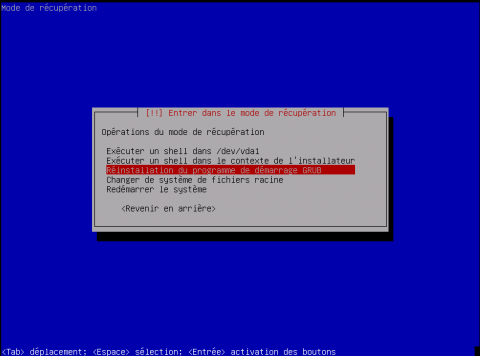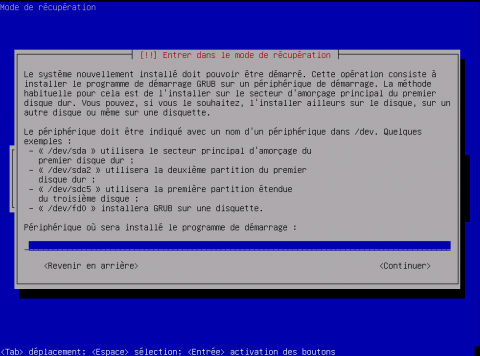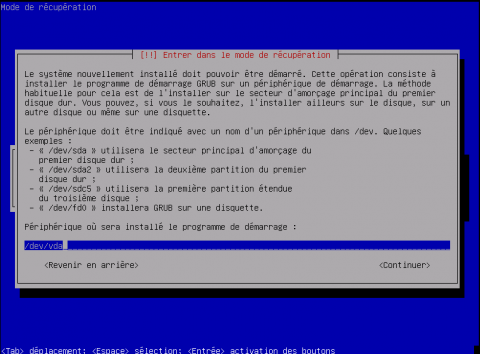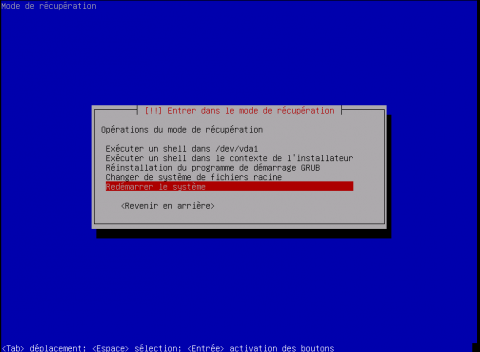Salut
Suite a une tentative de multi-boot Debian/Opensuse qui s’est mal terminée il a fallu que je chroot et je me suis aperçu de certains pb dans les mode d’emploi que je trouvais sur internet ( via mon smartphone, ça sert bien  )
)
1- je considère que vous avez la connaissance de votre installation existante, exemple je sais que Debian est sur /dev/sda1 de mon disque dur
2- le Live cd Debian que j’ai utilisé est un Jessie 8.3
-
Le live cd a bien booté, vous réussissez à ouvrir un terminal dont le prompt est
user@debian:~$ -
Ah dans la précipitation, vous n’avez pas pensé au clavier et vous vous retrouvez en qwerty
user@debian:~$ setxkbmap fr
pour cela il faut appuyer sur les touches setxkb,qp fr
- Vérification de l’état des partitions
user@debian:~$ sudo fdisk -l
Disk /dev/sda: 298.1 GiB, 320072933376 bytes, 625142448 sectors
Units: sectors of 1 * 512 = 512 bytes
Sector size (logical/physical): 512 bytes / 512 bytes
I/O size (minimum/optimal): 512 bytes / 512 bytes
Disklabel type: dos
Disk identifier: 0x00038c4c
Device Boot Start End Sectors Size Id Type
/dev/sda1 2048 19531775 19529728 9.3G 83 Linux
/dev/sda2 * 19533822 625141759 605607938 288.8G 5 Extended
/dev/sda5 19533824 35237887 15704064 7.5G 82 Linux swap / Solaris
/dev/sda6 35239936 594421759 559181824 266.7G 83 Linux
/dev/sda7 594423808 625141759 30717952 14.7G 83 Linux
Disk /dev/loop0: 829.6 MiB, 869924864 bytes, 1699072 sectors
Units: sectors of 1 * 512 = 512 bytes
Sector size (logical/physical): 512 bytes / 512 bytes
I/O size (minimum/optimal): 512 bytes / 512 bytes
- Dans mon cas le flag boot n’est pas sur la bonne partition, je le veux sur /dev/sda1
user@debian:~$ sudo fdisk /dev/sda
Welcome to fdisk (util-linux 2.25.2).
Changes will remain in memory only, until you decide to write them.
Be careful before using the write command.
Command (m for help): p
Disk /dev/sda: 298.1 GiB, 320072933376 bytes, 625142448 sectors
Units: sectors of 1 * 512 = 512 bytes
Sector size (logical/physical): 512 bytes / 512 bytes
I/O size (minimum/optimal): 512 bytes / 512 bytes
Disklabel type: dos
Disk identifier: 0x00038c4c
Device Boot Start End Sectors Size Id Type
/dev/sda1 2048 19531775 19529728 9.3G 83 Linux
/dev/sda2 * 19533822 625141759 605607938 288.8G 5 Extended
/dev/sda5 19533824 35237887 15704064 7.5G 82 Linux swap / Solaris
/dev/sda6 35239936 594421759 559181824 266.7G 83 Linux
/dev/sda7 594423808 625141759 30717952 14.7G 83 Linux
Command (m for help): a
Partition number (1,2,5-7, default 7): 1
The bootable flag on partition 1 is enabled now.
- on revérifie
Command (m for help): p
Disk /dev/sda: 298.1 GiB, 320072933376 bytes, 625142448 sectors
Units: sectors of 1 * 512 = 512 bytes
Sector size (logical/physical): 512 bytes / 512 bytes
I/O size (minimum/optimal): 512 bytes / 512 bytes
Disklabel type: dos
Disk identifier: 0x00038c4c
Device Boot Start End Sectors Size Id Type
/dev/sda1 * 2048 19531775 19529728 9.3G 83 Linux
/dev/sda2 * 19533822 625141759 605607938 288.8G 5 Extended
/dev/sda5 19533824 35237887 15704064 7.5G 82 Linux swap / Solaris
/dev/sda6 35239936 594421759 559181824 266.7G 83 Linux
/dev/sda7 594423808 625141759 30717952 14.7G 83 Linux
- On le retire de /dev/sda2
Command (m for help): a
Partition number (1,2,5-7, default 7): 2
The bootable flag on partition 2 is disabled now.
Command (m for help): p
Disk /dev/sda: 298.1 GiB, 320072933376 bytes, 625142448 sectors
Units: sectors of 1 * 512 = 512 bytes
Sector size (logical/physical): 512 bytes / 512 bytes
I/O size (minimum/optimal): 512 bytes / 512 bytes
Disklabel type: dos
Disk identifier: 0x00038c4c
Device Boot Start End Sectors Size Id Type
/dev/sda1 * 2048 19531775 19529728 9.3G 83 Linux
/dev/sda2 19533822 625141759 605607938 288.8G 5 Extended
/dev/sda5 19533824 35237887 15704064 7.5G 82 Linux swap / Solaris
/dev/sda6 35239936 594421759 559181824 266.7G 83 Linux
/dev/sda7 594423808 625141759 30717952 14.7G 83 Linux
- Nickel on écrit ça sur le disque
Command (m for help): w
The partition table has been altered.
Calling ioctl() to re-read partition table.
Syncing disks.
user@debian:~$ sudo fdisk -l
Disk /dev/sda: 298.1 GiB, 320072933376 bytes, 625142448 sectors
Units: sectors of 1 * 512 = 512 bytes
Sector size (logical/physical): 512 bytes / 512 bytes
I/O size (minimum/optimal): 512 bytes / 512 bytes
Disklabel type: dos
Disk identifier: 0x00038c4c
Device Boot Start End Sectors Size Id Type
/dev/sda1 * 2048 19531775 19529728 9.3G 83 Linux
/dev/sda2 19533822 625141759 605607938 288.8G 5 Extended
/dev/sda5 19533824 35237887 15704064 7.5G 82 Linux swap / Solaris
/dev/sda6 35239936 594421759 559181824 266.7G 83 Linux
/dev/sda7 594423808 625141759 30717952 14.7G 83 Linux
Disk /dev/loop0: 829.6 MiB, 869924864 bytes, 1699072 sectors
Units: sectors of 1 * 512 = 512 bytes
Sector size (logical/physical): 512 bytes / 512 bytes
I/O size (minimum/optimal): 512 bytes / 512 bytes
- On verifie le MBR
user@debian:~$ sudo dd if=/dev/sda bs=512 count=1 | strings
1+0 records in
1+0 records out
512 bytes (512 B) copied, 0.000385737 s, 1.3 MB/s
RPf1
Missing operating system.
f`f1
|fRfP
Ht[y9Y[
Multiple active partitions.
|XFSBu f
Operating system load error.
- C’est pas bon c’est pas marqué GRUB dedans
- On chroot
user@debian:~$ sudo mkdir /mnt/chroot
user@debian:~$ sudo mount /dev/sda1 /mnt/chroot
user@debian:~$ sudo mount --bind /dev/ /mnt/chroot/dev
user@debian:~$ sudo mount -t proc /proc /mnt/chroot/proc
user@debian:~$ sudo mount -t sysfs /sys /mnt/chroot/sys
user@debian:~$ sudo chroot /mnt/chroot
root@debian:/#
-
Là vous notez que le prompt à changé, c’est devenu root@debian:/#
-
On réinstalle grub
root@debian:/# grub-install /dev/sda
Installing for i386-pc platform.
Installation finished. No error reported.
root@debian:/#
-
Et voilà!
-
si besoin est vous pouvez verifier /boot/grub/grub.cfg et si vous ne le trouvez pas saisfaisant faire update-grub
-
On relit le MBR
root@debian:/boot/grub# dd if=/dev/sda bs=512 count=1 | strings
1+0 records in
1+0 records out
512 bytes copied, 0.000205447 s, 2.5 MB/s
RPf1
ZRr=
`|f
\|f1
GRUB
Geom
Hard Disk
Read
Error
- c’est bien écrit GRUB, ça sent meilleur

En tout cas ça ma sauvé et j’ai rebooter tranquille sur Debian

